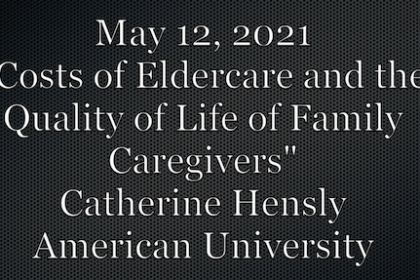
It is essential to maintain the quality of life of informal family caregivers because it affects the quality of the care provided and impacts their decisions on formal labor market participation. Opening for the first set of presentations of the annual meeting, Catherine Hensly (American University) presented collaborative research, with Jiweon Jun (Center for Transnational Migration and Social Inclusion, South Korea) and Dr. Elizabeth King (Brookings Institution), that studies the quality of life of unpaid family caregivers by examining the balance between the metal toll, physical burden, and opportunity cost and the satisfaction derived from caregiving.
The study sample contains 501 households surveyed in the 2018 Care Work-Family Survey for South Korea. The conceptual framework models the caregiver’s quality of life as a function of the mental toll, physical burden, opportunity costs, and the psychic reward of caregiving, subject to control variables such as characteristics of caregiver and their household. Furthermore, the study uses a generalized structural equations model utilizing a probit analysis that corresponds to the caregivers’ responses on their quality of life as dissatisfied, neutral, or satisfied.
The results show that care recipients with mild dementia increase the mental toll and physical burden on caregivers than recipients who do not. Additionally, the more physically independent the recipient is, the lesser the mental toll and physical burden, and the lesser the opportunity cost in terms of financial status and time for other activities. On the rewards side, the results show that the caregiver having a biological relationship with the care recipient and using professional care services positively impacts the mental reward.
To watch the full presentation, see below.
Written by Praveena Bandara, Research Assistant for the Care Economy Project and PhD student in Economics at American University.
